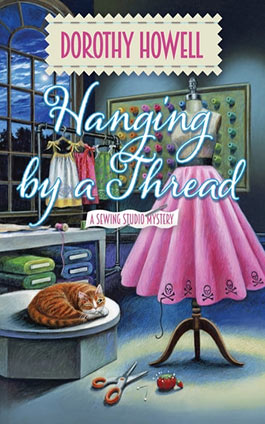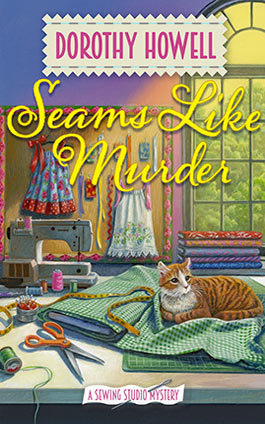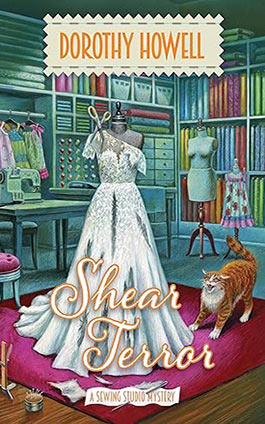Hanging by a Thread, A Sewing Studio Mystery
The latest novel in a new crafting cozy series in the genre-leading Kensington Cozy Mystery program focusing on the members of a Sewing Studio.
Some of the independent shops in this sleepy town are barely hanging on financially—and that includes Sarah’s Sweets, Abbey’s aunt’s bakery. The shop’s advantage—aside from the deliciousness of its products—is the fact that it’s the only bakery in the area. But it looks like that’s about to change. The second wife of a wealthy businessman wants her own bakery—and money is no object.
When murder unravels the plans for the competing shop, Aunt Sarah is an immediate suspect—and Hideaway Grove’s merchants are on pins and needles about a big upcoming women’s conference, fearing the organization will cancel their booking because of the crime. Abbey’s doing her best to stay optimistic and stitch some custom tote bags for the attendees, but she’s also concerned with patching up Aunt Sarah’s good reputation. And when it comes to sorting through the possible motives of the victim’s family members and associates, she’s got a few tricks up her sleeve . . .
The Sewing Studio Series in order:
“So how does it feel to be a movie director, Abbey? You must be so excited!”
Anna’s voice intruded, yanking me out of my worrisome thoughts. Mentally, I cringed. I’d been asked that question, or a similar version, too many times already.
“Are you the director, Abbey?” Connie asked before I could say anything. “I thought you were the producer.”
I was neither—and both, plus the cameraperson, sound guy, location scout, lighting expert, as well as the wardrobe, hair, and makeup crew, and anything else that needed to be handled. Little of which I knew much about. I’d been promised an experienced film crew, but so far I was running a one-person show.
I’d been volunteered for a number of projects since I’d arrived in Hideaway Grove, and this was the latest. I was okay getting involved with the town while I got my own business up and running—which, like the film project, was proving harder than I’d thought.
“Director, producer, whatever,” Anna said, and waved a spool of green thread around. “That movie you’re making for the town’s website will showcase everything Hideaway Grove has to offer and get more tourists in here. It’s just what the town needs.”
Hideaway Grove, with its specialty shops, antique stores, and art galleries, depended on tourists, visitors, and conferences to stay afloat.
“Amen to that,” Connie declared as she ran another perfectly straight seam through the sewing machine.
We were in the sewing studio I’d put together in the big storage room in my Aunt Sarah’s bakery working on pillowcase dresses, a charity project I headed up. Like Connie’s fabric store and Anna’s thrift shop, Sarah’s Sweets had been a mainstay in Hideaway Grove for decades.
Connie and Anna, who were in their forties, along with Sylvia, one of our librarians, were seated at the sewing machines I’d set up on banquet tables. We sewed dresses out of gently used pillowcases that we donated to the church. Several times a year, volunteers traveled to Africa and distributed them to girls in remote villages.
I should have been sitting and sewing, like the others, but I kept pacing the room, keeping an eye on my embroidery machine set up on another table and peering through the open pocket doors into the adjoining bakery. Jodi, who worked part-time, chatted with the customers in line at the display case. My Aunt Sarah stood at the big work island in the kitchen, tapping on her phone and frowning. Until lately, I’d rarely seen her frown. Now, I rarely saw her smile.
“And you’re making the whole movie using your phone?” Sylvia asked, pausing with scissors and bias tape in her hands.
I turned back to the women seated at the sewing machines. I’d set up the studio with the tables facing each other so we could chat while we sewed. A design board showcased examples of pillowcase dresses and ideas for fabrics and trims. I’d recently added a rolling rack where several dresses hung—another project I’d volunteered to take on.
“Video, sound, editing, everything,” I said. “Just using my phone.”
“You must have done that all the time when you worked for that big company in Los Angeles,” she said.
I’d retreated to Hideaway Grove after I’d lost my job at a marketing firm in L.A. and my life had imploded, glad to return to the town where I’d spent wonderful childhood summers with Aunt Sarah. With no kids of her own, Aunt Sarah had thrown herself into making our summers together a delightful adventure while my university-professor parents searched for ancient artifacts in remote locations around the world. They hadn’t wanted me with them, nor had I wanted to be there.
“Is something wrong, Abbey?” Sylvia asked, concern in her voice
I realized then that, like my aunt, I was frowning.
“I’m a little worried about Aunt Sarah,” I admitted.
The whir of the sewing machines stopped. All three women looked up at me, waiting.
“She hasn’t said anything,” I told them. “But I think she’s concerned about the new bakery that’s opening.”
“I knew it!” Anna smacked her palm on the table.
“Sarah has the only bakery in town, the only one we need,” Connie said. “And now here comes that Blaine Hutchinson—”
“That gold digger,” Anna declared.
“We’re all small business owners, barely hanging on financially,” Connie said. “More competition could kill us.”
Anna huffed. “I don’t know what Vaughn Harding was thinking, agreeing to lease that space to Blaine.”
“He didn’t dare refuse,” Connie said.
“It’s a prime location, right there at the hotel, the government and conference centers, among all the best restaurants and shops, and the village green,” Anna said. “It’s the first area of town all the tourists go to.”
I’d thought those same things, even though Aunt Sarah hadn’t commented on it. I hadn’t expected her to. She’d run her bakery alone right from the start. She’d handled her finances, maintained the building, and managed every aspect of her bakery without input from another soul. She’d never asked for a thing from anyone. When I’d arrived back in town she’d welcomed me into her home, allowed me to set up my sewing studio in her bakery storage room, and had refused my offer of rent. Still, I left cash for her on the kitchen table every week.
“A bakery, of all things,” Connie said. “Why would that Blaine Hutchinson open a bakery?”
“Oh, and the racket,” Sylvia complained. Her job at the library gave her a front row seat to everything happening on that end of town. “I’ve never heard so much construction noise—and it never ends. Almost everybody who comes into the library remarks on it.”
“I heard that Blaine hasn’t been satisfied with the work,” Connie reported. “She insists they keep doing things over.”
Voices in the bakery drew my attention. Lily, another volunteer I was expecting today, called a greeting to Aunt Sarah and Jodi as she rushed into the sewing studio.
“Am I too late?” she asked, looking a bit frazzled.
Lily was about my age—twenty-four. Where I had dark hair and was a little taller than average, she was a petite blonde. She’d been one of my first volunteers. She worked at Flights of Flowers florist just two blocks down Main Street, next door to Blaine’s new bakery.
“Sorry,” Connie said and switched off her sewing machine. “I’ve got to get back to the store. It’s almost closing time.”
“It’s that late?” Anna glanced at her watch. “I’d better go, too.”
“Oh, shoot!” Lily declared. “I couldn’t get away from the florist. There was another … incident next door.”
“We were just talking about her,” Anna said and rose from her chair. “What happened now?”
Talk had circulated around town for weeks about what a disruptive neighbor Blaine was, getting into squabbles over most everything with Rochelle, the owner of the flower shop.
“Parking,” Lily said. “Blaine keeps taking up two spaces in the lot behind the shops.”
Blaine drove a big Cadillac. She’d insisted on a custom paint job—gold—which had done nothing to diminish her gold-digger image around town.
Sylvia put aside the dress she was working on. “I’d better go, too. I know Sarah is going to lock up for the night soon.”
“I’ll let you know when we’re meeting again,” I told Lily.
Getting the ladies back into the sewing studio was always on an as-needed basis. When I’d put together enough pillowcases and notions to start on another batch of dresses, I texted my usual volunteers with a time and date to meet. I always put a sign in the bakery window, inviting anyone interested to join in. I’d never been disappointed with the turnout.
“Are you sure we can’t help you clean up?” Connie asked.
Every time we met, the ladies offered to help me tidy up the sewing studio but I always refused. They’d given their time to sew dresses. I wouldn’t ask them to do more.
“Thanks, but I’ve got it,” I said.
We left the sewing studio. In the bakery, the delicious smells wafted over me, bringing on the rush of childhood memories that was always welcome.
The bakery was painted mint green, with accents of pale pink and yellow. Several small, white tables and yellow, padded chairs sat by the front windows. A shelf held display cakes for special occasions, all beautifully handcrafted. A refrigerated case contained orders for pickup, and another featured cakes ready to be personalized for walk-in customers. The glass display case at the front of the bakery greeted customers with a mouthwatering array of cookies, cupcakes, and brownies. Gift items were offered for sale--cookbooks, mugs, birthday candles, plates and napkins, as well as cake stands, cookie cutters, and measuring spoons.
Aunt Sarah stood at the work island in the kitchen, swirling pink icing onto cupcakes. Jodi waited on two customers at the display case. Business as usual.
But I couldn’t help wondering how long it would last. Surely, the new bakery would impact Aunt Sarah’s business. And then what? Would she be able to hang on, financially? Would she be able to afford Jodi, even though she worked only part-time? Where would Jodi work if Aunt Sarah had to let her go? Could Aunt Sarah—healthy, fit and trim, but almost sixty-years old—manage the day-to-day on her own? Or, worse, what would happen to Aunt Sarah if her bakery went under? Was she financially ready for retirement?
When the last customer left the store, Anna stepped up to the display case.
“Everything looks delicious,” she said. “It’s so hard to decide.”
“You can’t beat our sugar cookies,” Jodi said.
Jodi, thirtyish, had dark hair that set off her blue eyes, and a curvy figure. She and Aunt Sarah made a great team. They shared an intense degree of care for their handcrafted baked goods and created an inviting neighborhood environment the tourists and locals flocked to.
“I’ll take one,” Anna said.
Jodi frowned. “One?”
“One dozen!” she said and they both laughed.
The bell over the door chimed as Sylvia opened it to leave. Outside, the sun was going down but the streetlamps hadn’t come on yet. Traffic was light. A couple strolled past.
“Thanks for coming today,” I called.
Sylvia and Connie waved as they left the bakery.
“I know you’re about to close. Is it too late to get a cupcake?” Lily peered over the display case into the kitchen where Aunt Sarah was at the work island. “I can’t resist pink icing.”
“I know what you mean,” Jodi declared. “I can’t resist a pink cupcake or a man with big, wide shoulders.”
Lily giggled. “I’ll take two.”
“Men or cupcakes?”
The bell over the door chimed again and a woman hurried inside. I expected her to head straight to the display case but she didn’t.
“I’m so glad I caught you,” she said to me in a low voice.
It took me a second to realize who she was. I’d seen Imogene around Hideaway Grove and knew she owned a business, but I couldn’t remember what it was, at the moment. She was in her sixties, with white hair and rosy cheeks; in a red dress and mop cap she could easily pass for Mrs. Claus.
“Could we chat a bit?” Imogene glanced at Jodi and Lily at the display case and Aunt Sarah in the kitchen, and lowered her voice further. “In your sewing studio?”
I gestured for her to go ahead of me, and followed her inside. I’d often given impromptu tours of the sewing studio, though there wasn’t that much to see at the moment. I had a plan to improve the space, as soon as I could afford it.
Imogene walked to the farthest corner of the room and fidgeted a bit, showing no interest in my design board, my rack of completed pillowcase dresses, or anything else in the studio. I started feeling a little uncomfortable.
“This is somewhat … somewhat difficult for me.” Imogene whispered. “I need help and I thought of you. I heard about that … that situation you were in with Miss Merriweather.”
Miss Merriweather was the sweet, kind, elderly granddaughter of the town’s founder. The memory of what had happened still left me feeling uneasy.
Imogene seemed sweet and kind, too. I drew a breath and braced myself.
“What sort of help do you need?” I asked.
She glanced around, then at me again. “I’m afraid that something, well, something untoward is going on at my shop.”
Untoward. I wasn’t sure what that meant, exactly, or how I could help her.
“Now, I know this might sound silly,” Imogene said. “I’m sure you’ll think that nobody, except for maybe a small child, would steal from a toy store.”
I remembered then that Imogene owned Dottie’s Toys, an adorable shop on Main Street near the government center and the village green.
“A shoplifter?” I asked.
Anyone who owned a retail business had to deal with that from time to time. Aunt Sarah had lost some of her gift merchandise to sticky fingered-customers.
Imogene shook her head. “Oh, no. It’s more than that. Much more. You see, for quite a while now I’ve been putting aside vintage toys that I’ve found at antique stores, estate sales, yard sales, swap meets, that short of thing. You know, for the craft fair at the women’s conference.”
Hideaway Grove’s next big event was the regional meeting of the Women’s Alliance for Progress, a three day conference that was coming up soon and was expected to be a much needed boost to the town’s economy.
“The theme of their conference is How Far We’ve Come,” Imogene said. “The organization started back in the fifties, you know.”
The conference committee had insisted that everything about their event should have a retro look and feel to it. Aunt Sarah and Jodi had been working on special desserts from that era; they were having more luck than I was with the conference prep.
Imogene glanced around making sure, once more, that we were alone. “Some of the toys I set aside are gone. Missing. Stolen, I’m afraid.”
“Stolen out of your store?”
“The stockroom. I haven’t put them out on display because I’m not ready to sell them, though I certainly could use the income,” Imogene said. “I’d planned to showcase them at the conference craft fair and, hopefully, sell them to the attendees. The toys are very desirable. You know, childhood memories. The women who’ll be attending are somewhat well-to-do, I understand, and I’d hoped I’d get a good price for them.”
“You’re sure they’re stolen? Maybe one of your employees sold them by mistake?”
“Impossible. I put them in a special place in my stockroom and specifically told everyone not to touch them. I even put up a sign. Many of the toys are in their original packaging. Handling them too much could decrease their value significantly.”
I thought for a moment. “How do you think your customers are getting into your stockroom to steal them?”
Imogene’s already rosy cheeks reddened further. “It couldn’t be a customer. I’m afraid … I’m afraid it’s one of my staff. One of the girls who works for me.”
That bit of info put a different spin on Imogene’s problem. Bad enough to have expensive merchandise stolen, but to have it taken by someone she’d hired and trusted was worse.
“How can I help?” I asked.
“I want you to catch the culprit and get my toys back.” She paused as if more deeply pained than before. “I know who’s taking them. I think I know. I’m pretty sure.”
“Have you confronted her?”
“Oh, no. I couldn’t possibly do that. She’s the nicest girl. Just the nicest girl ever.”
“Then go to the sheriff. He would—”
“No, no, no.” Imogene shook her head frantically.
“Why not?”
“You see, I suspect it’s Holly who’s taking the toys,” she said, as if that explained everything.
I just looked at her, waiting. When she didn’t go on, I said, “And?”
“Holly is Sheriff Grumman’s niece.”










